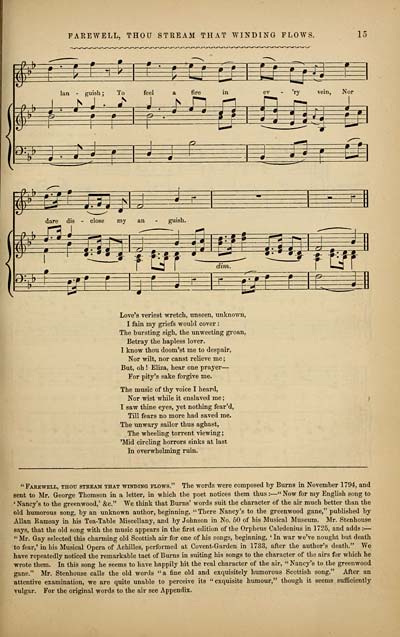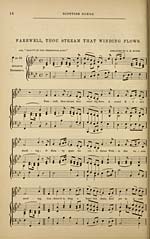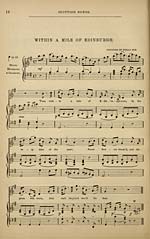Inglis Collection of printed music > Printed music > Songs of Scotland adapted to their appropriate melodies > Volume 3
(27) Page 15
Download files
Complete book:
Individual page:
Thumbnail gallery: Grid view | List view

FAREWELL, THOU STREAM THAT WINDING FLOWS.
15
=*F*=
g=f-r— r
9
^=»
s^ g g
lan - guish; To feel a fire
ev - 'ry vein, Nor
#
»=7C
a^E
s-
3=H
^
=ea
3t=t
:» 0-rr
^EEm^tt^-
dE=:
B
dare dis - close my an - guish.
&r
^^
*FM
dim.
* f tff
b^;
^Tjr
^
s£
-©-
Love's veriest wretch, unseen, unknown,
I fain my griefs would cover :
The bursting sigh, the unweeting groan,
Betray the hapless lover.
I know thou doom'st me to despair,
Nor wilt, nor canst relieve me ;
But, oh ! Eliza, hear one prayer —
For pity's sake forgive me.
The music of thy voice I heard,
Nor wist while it enslaved me ;
I saw thine eyes, yet nothing fear'd,
Till fears no more had saved me.
The unwary sailor thus aghast,
The wheeling torrent viewing ;
'Mid circling horrors sinks at last
In overwhelming ruin.
"Farewell, thou stream that winding flows." The words were composed by Burns in November 1794, and
sent to Mr. George Thomson in a letter, in which the poet notices them thus : — " Now for my English song to
' Nancy's to the greenwood,' &c." We think that Burns' words suit the character of the air much better than the
old humorous song, by an unknown author, beginning, " There Nancy's to the greenwood gane," published by
Allan Ramsay in his Tea-Table Miscellany, and by Johnson in No. 50 of his Musical Museum. Mr. Stenhouse
says, that the old song with the music appears in the first edition of the Orpheus Caledonius in 1725, and adds : —
"Mr. Gay selected this charming old Scottish air for one of bis songs, beginning, ' In war we've nought but death
to fear,' in his Musical Opera of Achilles, performed at Covent^Garden in 1733, after the author's death." We
have repeatedly noticed the remarkable tact of Burns in suiting his songs to the character of the airs for which he
wrote them. In this song he seems to have happily hit the real character of the air, "Nancy's to the greenwood
gane." Mr. Stenhouse calls the old words "a fine old and exquisitely humorous Scottish song." After an
attentive examination, we are quite unable to perceive its "exquisite humour," though it seems sufficiently
vulgar. For the original words to the air see Appendix.
15
=*F*=
g=f-r— r
9
^=»
s^ g g
lan - guish; To feel a fire
ev - 'ry vein, Nor
#
»=7C
a^E
s-
3=H
^
=ea
3t=t
:» 0-rr
^EEm^tt^-
dE=:
B
dare dis - close my an - guish.
&r
^^
*FM
dim.
* f tff
b^;
^Tjr
^
s£
-©-
Love's veriest wretch, unseen, unknown,
I fain my griefs would cover :
The bursting sigh, the unweeting groan,
Betray the hapless lover.
I know thou doom'st me to despair,
Nor wilt, nor canst relieve me ;
But, oh ! Eliza, hear one prayer —
For pity's sake forgive me.
The music of thy voice I heard,
Nor wist while it enslaved me ;
I saw thine eyes, yet nothing fear'd,
Till fears no more had saved me.
The unwary sailor thus aghast,
The wheeling torrent viewing ;
'Mid circling horrors sinks at last
In overwhelming ruin.
"Farewell, thou stream that winding flows." The words were composed by Burns in November 1794, and
sent to Mr. George Thomson in a letter, in which the poet notices them thus : — " Now for my English song to
' Nancy's to the greenwood,' &c." We think that Burns' words suit the character of the air much better than the
old humorous song, by an unknown author, beginning, " There Nancy's to the greenwood gane," published by
Allan Ramsay in his Tea-Table Miscellany, and by Johnson in No. 50 of his Musical Museum. Mr. Stenhouse
says, that the old song with the music appears in the first edition of the Orpheus Caledonius in 1725, and adds : —
"Mr. Gay selected this charming old Scottish air for one of bis songs, beginning, ' In war we've nought but death
to fear,' in his Musical Opera of Achilles, performed at Covent^Garden in 1733, after the author's death." We
have repeatedly noticed the remarkable tact of Burns in suiting his songs to the character of the airs for which he
wrote them. In this song he seems to have happily hit the real character of the air, "Nancy's to the greenwood
gane." Mr. Stenhouse calls the old words "a fine old and exquisitely humorous Scottish song." After an
attentive examination, we are quite unable to perceive its "exquisite humour," though it seems sufficiently
vulgar. For the original words to the air see Appendix.
Set display mode to: Large image | Transcription
Images and transcriptions on this page, including medium image downloads, may be used under the Creative Commons Attribution 4.0 International Licence unless otherwise stated. ![]()
| Special collections of printed music > Inglis Collection of printed music > Printed music > Songs of Scotland adapted to their appropriate melodies > Volume 3 > (27) Page 15 |
|---|
| Permanent URL | https://digital.nls.uk/94711912 |
|---|
| Shelfmark | Ing.129 |
|---|---|
| Additional NLS resources: | |
| Attribution and copyright: |
|
| Description | Scottish and English songs, military music and keyboard music of the 18th and 19th centuries. These items are from the collection of Alexander Wood Inglis of Glencorse (1854 to 1929). Also includes a few manuscripts, some treatises and other books on the subject. |
|---|
| Description | The Glen Collection and the Inglis Collection represent mainly 18th and 19th century Scottish music, including Scottish songs. The collections of Berlioz and Verdi collected by bibliographer Cecil Hopkinson contain contemporary and later editions of the works of the two composers Berlioz and Verdi. |
|---|

